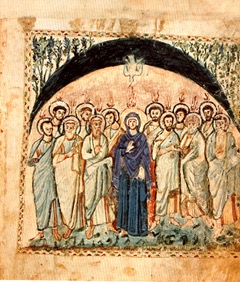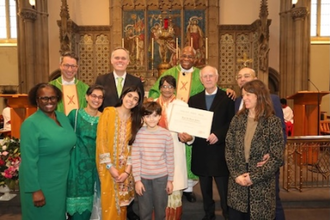Pentecost Sunday Reflection with Canon Robin Gibbons: 8th June 2025

Rabula Gospels Folio 14v Pentecost
It is always good to remind ourselves that Christianity inherits much from Judaism and the wider cultural history of the Near and Middle East, mainly because it stops any of us in other cultures from claiming privileged access to what we understand as our Scriptures and the origins of Christian faith and worship.
Pentecost was a Jewish celebration observed 50 days after the first day of Passover, it celebrated the first fruits of the wheat harvest. We can find the original instructions for the celebration of this feast in Leviticus 23 alongside the other appointed festivals. It was also called the Feast of Weeks and Shavuot, celebrating God giving Moses and the people of Israel the Law, giving them their national identity under God and teaching them to love God and their neighbours as a community.
Thus the day of Pentecost which we celebrate today, brings together elements of this ancient tradition but in that uniquely Christian way of viewing it through the lens of the incarnation and resurrection, as the gift of salvation won for us by Christ.
In fact this feast can be understood by us as a completion of the promises made by God to Israel, fulfilled in Jesus and now present to, with, and in us, by the gift of the Holy Spirit.
The drama of that wonderful day of Pentecost is expressed clearly in our reading from Acts 2:1-13. It comes after the Ascension of Jesus when the community are gathered in 'one place' not hiding but waiting. Into that setting of expectation there come two 'happenings' that directly connect us to older scriptural references. Firstly there is great noise, so strong and powerful it seems like the sound of a mighty wind taking up every space, surrounding the gathered people, a phenomenon which immediately recalls the noise the people heard when Moses met with God on Mount Sinai (Exodus 19-20). Unlike that meeting between God and Moses, from this encounter, the presence of the Lord will now be given to each one present.
Then there is that second image of fire which parted and seemed to rest on each person as tongues of flame, an image which recalls John the Baptist's proclamation that the one to come would baptize them not with water, but with fire. So these two manifestations are a renewed visual presence of the All Holy God in the person of the Spirit, but here in Pentecost it goes further, for the presence of God does not frighten but inspires. We need to note that this happening was not only for then, but is also for us today, as through baptism and confirmation the presence of the Spirit enters into each one of us, enabling us to praise, preach, and proclaim the Good News in many languages, a reverse of the story of babel, for now the noise of confused babble turns into words that are understood, where the deeper more powerful language of love enters our hearts and souls..
How do we respond to this? It is very clear that the writer of Acts knows well that the gift of the Spirit, as it happened at that Pentecost, cannot be recreated in the same way for us. Yet it is not a 'one off' happening, but a sign of the permanent enabling of the Spirit's gifts given to each of us, in subtler, different ways so that the proclamation of salvation can be spread throughout the earth until the end of time: 'And they were all filled with the holy Spirit and began to speak in different tongues,* as the Spirit enabled them to proclaim'.(Acts 2:4) There is much to think about in that word 'enabling'. We have pointers to what the Spirit does with us, for instance in that well known passage of Paul in 1 Corinthians 13, we find lists of the gifts of divine love and its attributes. This Sunday there are various alternative readings for the Masses of this feast, but if we take both 1 Corinthians 12 and Romans 8, we discover there are powerful pointers to what the Spirit is and what the Spirit does with and for us. I Cor 12 gives us that image of ourselves as parts of the body each different yet working together in unity through the Spirit. In Romans we discover that we are given the promise of eternal life through the indwelling Spirit. This is all the enabling work of the Spirit.
Perhaps this text from the Gospel might help us enter a bit more into the mystery of Pentecost in our lives and understand the Holy Spirit as one who will always be on our side if we but ask: "If you love me, you will keep my commandments. And I will ask the Father, and he will give you another Advocate* to be with you always, the Spirit of truth,* which the world cannot accept, because it neither sees nor knows it. But you know it, because it remains with you, and will be in you. (Jn 14: 15-17)
It is time that we turned more to the tradition of our Eastern Churches who have always had a deep understanding and love of the Holy Spirit. Eastern Church theologians loved to expound on the person and work of the Holy Spirit. Gregory of Nyssa viewed the Spirit as the transforming power of the Triune God through which God's love and power are communicated to human life and enable us to become like God. John Chrysostom reminds us that the Spirit is the one who guides us to truth and leads us to eternal life, Basil echoes this understanding of the Holy Spirit as the one who brings all things to life, who sustains all things, and who directs all things towards their ultimate goal".
Their deep spirituality and sense of joy that the Spirit gives permeates their liturgy and prayers and allows one to approach God without any anthropomorphic imagery, taking us into new dimensions of 'seeing' God in all creation. The following prayer is found in the Byzantine tradition and might be one we use ourselves to call on the 'advocate' to help us! "O Heavenly King, the Comforter, the Spirit of Truth, Who art everywhere and fillest all things; Treasury of Blessings, and Giver of Life - come and abide in us, and cleanse us from every impurity, and save our souls, O Good One".
LECTIO
From a homily on Pentecost by St John Chrysostom
Paul called this Spirit the Spirit of adoption and the Spirit of grace, inasmuch as in the waters of the baptismal font we're born again of water and the Spirit, and are adopted as [God's] children. In the same way, the Lord said to Nicodemus: 'Unless people are born of water and of the Spirit, they cannot enter into the kingdom of God'.
So, the Holy Spirit is the Spirit of adoption and the Spirit of grace, since grace and truth came by Jesus Christ, through the Holy Spirit, for those who have been born by the power of God.
Moreover, the Spirit is called the Comforter, because He's also our advocate with the Father. And not only is He with the Father, but He's always with us, too, as a gift.
'And I will ask the Father, and He will give you another Comforter, so that He may abide with you forever', comforting your hearts and making them steadfast in divine patience and trust in Christ. Given that the holy Apostles received this testament after Christ's holy Resurrection from the dead, and that they were sent forth to teach and to baptize in the name of the Father and of the Son and of the Holy Spirit, and since we've already been vouchsafed this true washing by the Holy Spirit, let us strive to keep our souls and our bodies undefiled as we glorify the Most holy and consubstantial Trinity, the Father and the Son and the Holy Spirit, now and ever and unto the ages of ages. Amen.
Pentecost - A sonnet by Malcolm Guite
Today we feel the wind beneath our wings
Today the hidden fountain flows and plays
Today the church draws breath at last and sings
As every flame becomes a Tongue of praise.
This is the feast of fire, air, and water
Poured out and breathed and kindled into earth.
The earth herself awakens to her maker
And is translated out of death to birth.
The right words come today in their right order
And every word spells freedom and release
Today the gospel crosses every border
All tongues are loosened by the Prince of Peace
Today the lost are found in His translation.
Whose mother tongue is Love in every nation.


















